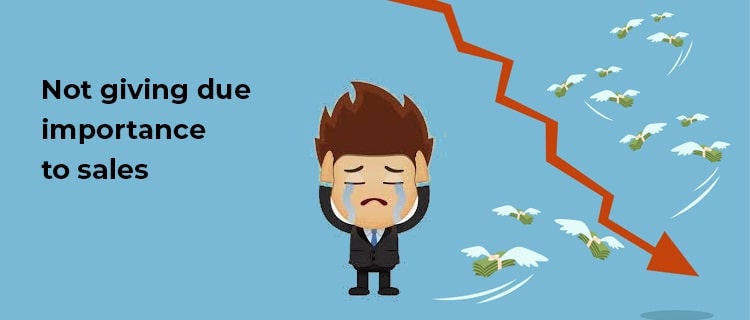10 Deadly Mistakes Which Small Businesses Should Avoid
By Siddharth Kamble

Running a business is not an easy job. At the initial stage of any business, you take up multiple jobs at once, including CEO, CFO, Marketing, HR, etc.
While you’re trying to multitask, small things get ignored very easily, which can turn into big mistakes.
Below is a list of few of the costliest mistakes in business. Review them carefully and reduce your chances of making these mistakes.
- Lowering prices/giving discounts
As an early entrepreneur, you are hungry for success. In order to lure new customers, some entrepreneurs give huge discounts. It is surely a good strategy in the short term, but not in the long term. Customers who come for low prices, also go back as soon as you normalize the prices.
Have faith in your product and charge the prices which you can justify. Customers will eventually come and stay longer.
- Not willing to delegate

If you’re one of those business owners who feel like doing everything themselves, stop now. You will not only burn yourself out but also lose efficiency. Therefore, you must learn to delegate effectively. Delegating is as important as creating your continuity plan for business.
Make sure that you build a team of talented individuals who are experts in their respective fields. So, that you don’t have to be involved in everything. You can concentrate on expanding the business.
- Neglecting to network
Spending time with business partners, fellow businessmen and potential clients is as important as the business itself. In order to maintain success, it is important for the entrepreneurs to keep networking. Organised events and invite all industry peers and potential customers. Follow up with clients to show that you care about their presence.
- Not giving due importance to sales

Some business owners get too involved in other things that they almost forget to take care of their sales. Sales are the lifeblood of any company. If you’ve spent years and money making the product and your company around it, then you must en-cash it. Do not micromanage every department. Concentrate more on sales, only that will keep your business going.
- Starting without proper funding
Funding is the fuel on which a business keeps moving. A business can take up different paths to attain funding and use more than one option.
The capital which partners, shareholders or business members bring in at the initial stage of business, is crucial. If there is a sufficient amount of capital invested in a business, it can run smoothly. Lack of money is a very common cause of failure in any business.
- Working with wrong people
One of the biggest mistakes in business can be working with the wrong people. Many companies terminate co-founders, upper management people or employees, due to integrity or other major issues. Learn to identify problems at an early stage and culminate them.
- Not willing to change
Successful business owners are those who understand that things won’t always go according to their plan. They are willing to change their approach if things don’t work. Businesses which are not willing to change even after failing multiple times will eventually perish. Someone rightly said, “Better bend than break”.
- Ignoring intellectual property
Intellectual property describes almost all the intangibles in your business, including trademarks, copyrights, trade secrets, etc. If you ignore your IP, others can easily copy your business. Without protection of ideas, businesses and individuals would not reap the benefits of their inventions and would focus less on research and development.
- Working with friends as business partners

Two people who are very good friends may not necessarily turn out to be good business partners as well. Starting a business with friends is a very common mistake which entrepreneurs commit. Starting a business together can destroy a relationship. Many friends enter into a new venture together with great intentions. However, it puts your friendship to test. Some endure the tests while others do not.
- Planning only for success
Every entrepreneur dreams big, but sometimes things don’t go as planned. In order to be successful, a new business must develop contingency plans in case if the idea doesn’t turn out to be as big of a hit as expected. Businesses who plan only for success find themselves in trouble at the time of failure.
People often ignore to develop a strong “Plan B” because they have a lot of emotional attachment with their “Plan A” that they want to deliver. Also, there’s often a low probability of a crisis occurring, so people often don’t see contingency planning as an urgent activity. However, the Plan B needs to be properly thought through.
Conclusion
Some people start a business just because they want to be their own boss. Without understanding the full responsibilities of running a business, they often ignore important things. Follow our tips to avoid the most common mistakes and save your business.
- 10 Deadly Mistakes Which Small Businesses Should Avoid - November 13, 2018
